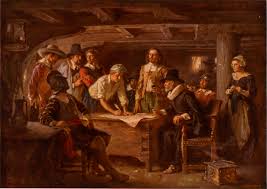
The Mayflower Compact is one of our nation’s founding documents and it was foundational in the settlement of Plymouth Plantation, one of the first English colonies in North America. It was signed aboard the Mayflower by the Pilgrims in 1620 off the coast of Plymouth.The Mayflower Compact provides a glimpse into the true nature of the Pilgrims and their desires to establish a civil government in New England. The Mayflower Compact begins with the words “In the name of God, amen. We, whose names are underwritten, the loyal subjects of our dread sovereign lord King James, by the grace of God, of Great Britain, France, and Ireland, king, defender oft he faith, etc.” This introduction shows the Pilgrims devotion to God and their loyalty to the British crown. In order to realize just how big a deal the latter is we need to understand the reasons behind the Pilgrims’ departure from England. The cause of their voyage lay in religious freedom. The King James mentioned in the Mayflower Compact is James I of England (James VI of Scotland). He declared that there was a “divine right of kings” that gave rulers authority to do practically whatever they wanted. The divine right of kings was a belief that God had given kings power and these kings could use their power without restriction. James I used his supposedly God-ordained total power to persecute religious minorities in England: mainly the separatists. The Separatists were English Puritans who believed that the Church of England, the government-sanctioned church, was beyond reform and therefore that separation was necessary. James actively sought out Separatists and sent them to jail. The Pilgrims fled to Holland but then returned to England because of Holland’s corrupt money-centric culture. They realized that their only other option was to traverse the great waters of the Atlantic and land in the unknown New World.
So to say that they were the loyal subjects of King James and that he was the “defender of the faith” required a great deal of long-suffering. But the Compact does not end there: it continues, “Having undertaken, for the Glory of God, and advancements of the Christian faith and honor of our King and Country,”. Therefore, the goals of the Pilgrims are clear: they undertook their voyage, not only to protect their freedom, but also to found a distinctly Christian and distinctly English colony in North America. The Compact mentions their attempt to colonize Virginia but a storm blew off course to Massachusetts. The rest of the Compact outlines their plans to settle a civil governing body and establish an organized colony.
I think what is the most striking thing about the Mayflower Compact is the high reverence that the Pilgrims placed on both God and King and their desire to advance the interest of these two entities through their own government. The Compact demonstrates the Christian nature of most colonies (Plymouth, Massachusetts Bay, Pennsylvania, Rhode Island, etc.) at the time and the loyalty to the Crown of England that the Colonists had for multiple decades. This devotion to King would eventually wear down and rebellion would begin but devotion to God would not disappear for a long time.
